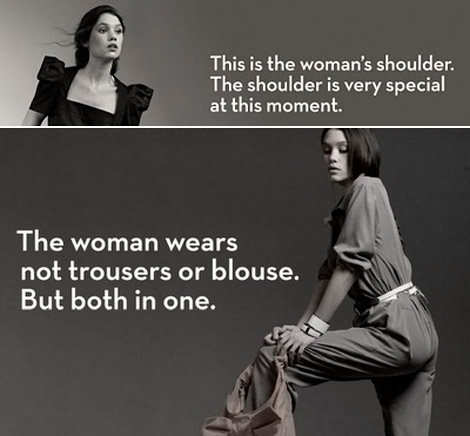
For my last round of blogging, I wanted to depart a little from what we’ve been posting to something a little off the beaten path. A little while ago I was reading in the Wall Street Journal’s Marketplace section about one of my favorite brands, French Connection, and their launch of a new advertising campaign. The article caught my attention for three reasons 1. I love fashion 2. I love advertising as I am a marketing major and 3. the campaign was entirely inspired by film noir! I know we ventured very far since those noir days (and sorry for going back to there) but I thought this was really cool and wanted to share. The campaign involves both print and commercial advertisements (mostly for international markets so we may not even see them here in the US, and hence the foreign accents on the commercial). Take a look:
French Connection ‘The Woman’ from Fashion Copious on Vimeo.
French Connection ‘The Man’ from Fashion Copious on Vimeo.
As you can see, the commercials are a little odd (definitely seem fit more for the European market than the American market). But I think it’s so great that they drew inspiration from film noir. First of all, “the woman” and “the man” reminds me (and probably deliberately so) of the “femme fatale” and the “hero,” the stock characters of the noir film. The black and white filming of them is clearly noir related, as is the seductive (for the woman) and mysterious (for the man) feel of the commercials. I love when advertisements get creative and wacky, as this is, drawing on the seriousness of noir but with humor (“look at his heart. Or rather look at his shirt…he wears not sequins. He knows not what sequins is”). This also reminds me and gives me a little inspiration for our final project, for being influenced by something, such as in this case a film technique/genre, doesn’t mean copying it entirely, but it means taking aspects of the technique and twisting them and making them your own, thereby creating a whole new entity, and not simply a recreation of something that already exists.